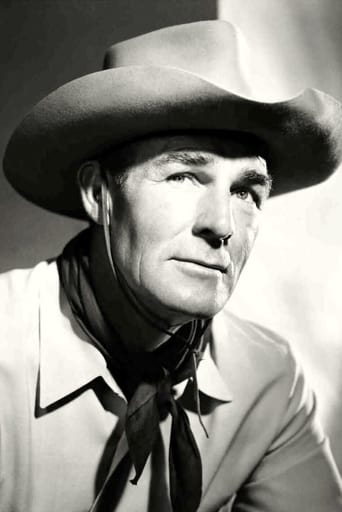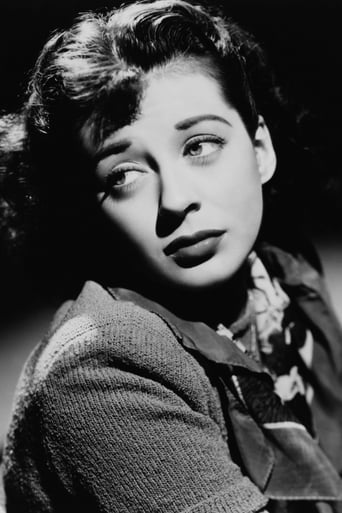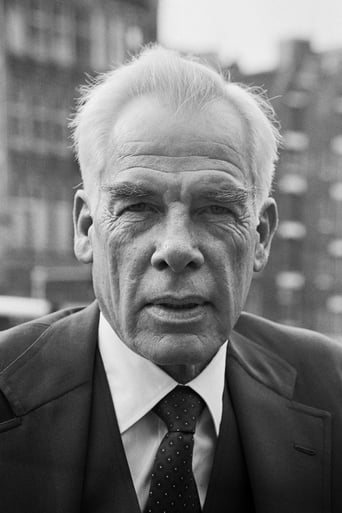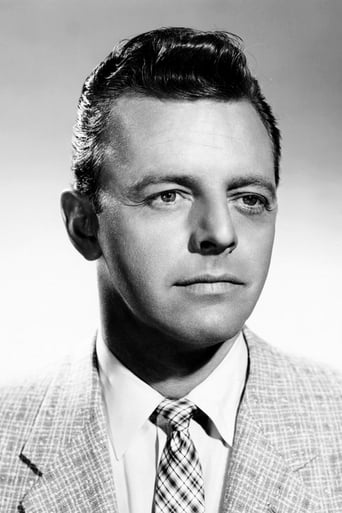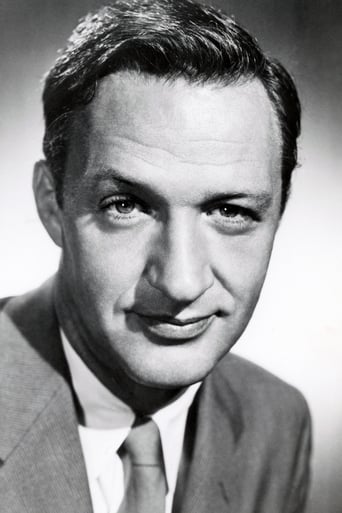Lovesusti
The Worst Film Ever
FirstWitch
A movie that not only functions as a solid scarefest but a razor-sharp satire.
Hayden Kane
There is, somehow, an interesting story here, as well as some good acting. There are also some good scenes
classicsoncall
You'd be safe calling this one of your better underrated Westerns. Randolph Scott of course is always solid, but what I liked about this picture was the way it took it's time to reveal Ben Stride's back story, leaving the character somewhat ambiguous following the opening scene when he gunned down two of the Wells Fargo bandits. The story line also dangled the character of John Greer (Walter Reed) as a question mark, as we learn about his role concerning the gold heist via the brains behind the robbery. This was all quite cleverly written, with the added twist of a possible romantic angle between Stride and Annie Greer (Gail Russell).There's something to be said about that romantic angle. Director Budd Boetticher uses an interesting technique to film what one might consider a love scene between Stride and Mrs. Greer. With Ben Stride bedding down for the night underneath the Greer wagon, Annie Greer appears in a seductive night dress and speaks to Stride as he's about to go to sleep. The way it's filmed, it's almost as if both characters are speaking face to face, such is the connection Boetticher establishes between the two characters. There's another scene later on between the two in which Stride wards off a near kiss from Annie, quite unlike any situation I've run across in a film before, providing a conflicted moment for the film's hero who needs to remain focused on his original mission.If you're counting coup on the film's title, there are indeed seven men called to account for the Wells Fargo job. Interestingly it was Lee Marvin's character who had a hand in taking out a couple, once in the desert during the Chiricahua attack when he saved Ben's hide, and then near the finale when he took it to Payte Bodeen (John Larch). When it came to the final confrontation between Stride and Masters (Marvin), you couldn't blink or you would have missed that incredulous 'how'd you do that?' look Masters gives his adversary when he gets out-gunned. One of the more satisfying showdowns you'll run across in a Randolph Scott Western.
disinterested_spectator
Seven men rob Wells Fargo, steal a lot of gold, and kill Ben Stride's wife in the process. He sets out to avenge her death, and while he is at it, he retrieves the gold as well. Justice is served. But there is another injustice that has to be addressed in this movie.When Stride first happens across John Greer and his wife Annie, we can see right off that this guy is a wimp, and we wonder how he ever got himself a wife like Annie. Even when she falls in the mud, she oozes sex appeal. Later, when they are joined by Bill Masters and his partner Clete, Masters poses the question to Clete as to why a full woman like Annie would settle for half a man. He is right. Greer just does not deserve Annie.A man like Masters is the sort who cannot help stepping on something little, so one night while Stride, Greer, Annie, and Masters are inside the covered wagon, Masters starts talking about how deliciously desirable Annie is, practically ravishing her with his words, while her husband, who is being verbally cuckolded, just sits there and takes it. Masters also talks about how he once knew another woman like Annie, who eventually ran off with a real man, suggesting that she has a thing for Stride. And apparently she does, because later when Stride says goodbye to her, she moves in to be kissed, although Stride does not avail himself of the opportunity. For one thing, he is a recent widower, and for another, he is too upright to take another man's wife.We know that Stride will eventually kill all the men who stole the gold and caused his wife's death, because that is routine for a Western. It is the injustice of Greer's being married to Annie that worries us, for there is no standard convention for handling that situation. When Stride discovers that Greer had been hired by the robbers to transport the gold, he takes the box of gold away from Greer and tells him and Annie to go west. We get a sinking feeling. The wrong will never be righted. Fortunately, Greer decides to go south to inform the sheriff of Stride's situation.Before Greer can get to the sheriff's office, the leader of the men who hired him to transport the gold shoots him down in the street. Because Greer knowingly risked his life and lost it trying to help Stride, Masters says he was wrong, that Greer was a man after all. Well, it is nice of Masters to say that, being generous about the man now that he is dead, but we know better. After all, Greer was not wearing a gun, and in a Western, that is always the mark of a weakling. And thus it is that when Greer is shot in the back unarmed as he walks to the sheriff's office, we breathe a sigh of relief. Though Annie says she loves her husband, yet we know that this is for the best.Later, after Stride has returned the gold, he tells Annie where he will be working as a deputy and indicates that he would be glad to see her, if ever she should be passing by that way. She quickly decides that after a decent interval (both have recently murdered spouses), she will take him up on that offer. This makes us feel good, because Stride is the real man she has needed all along. When they finally get married and he gives it to her the way her first husband never could, justice will finally be restored.
Scarecrow-88
Exceptional western from Budd Boetticher, with Randolph Scott's genre icon status enhanced considerably thanks to his association with it (and the director, it would turn out) is a real gem that was given a resurgence thanks to a DVD release and heavy emphasis on Turner Classic Movies (especially concerning Budd's renown as a great director of the American western). Revisiting it on the Encore Western Channel, it was once again a real pleasure.The story seems relatively simple, but it is the performances and direction that catapults it in quality. Scott is looking for revenge because a chest was robbed from a Wells Fargo bank residing in Silver Springs, his home town, leading to the murder of his wife (who worked at the bank because he was too full of pride to take a deputy position after losing his re-election as sheriff). Those seven men responsible are his targets, two killed right at the beginning of the film. Lee Marvin and Don 'Red' Barry are interested in recovering the loot if they can, tagging along with a stage being led to California by Scott (Walter Reed and Gail Russell, the married couple driving the stage, caught in a serious mud hole when Scott first meets them). Marvin spends time emasculating Reed (often referring to him as "half a man") while lustfully gazing and referring to Russell as a mighty fine ("full") lady he can't stop talking to Barry about. One scene, while it rains in the dark of the night, has Marvin mentioning a "yarn" about a tall man and a fine woman he took from her husband, obviously insinuating Scott's feelings for Russell (while also describing Russell in an intimate manner as Reed appears more than a bit uncomfortable).Marvin steals the film as this rather opinionated, blunt, confident gunfighter, not afraid to face down anyone that would stand in his way of securing a hefty profit from someone else's thievery. Marvin's addition of the showboating with his pistols, combined with all the needling of Scott, is just a brilliant piece of work. His showdown with Scott isn't performed as if both men hated each other, but instead it is viewed as an unfortunate event between two men over the acquiring of the Wells Fargo loot. For Scott, it should be returned to its rightful place in memory of his wife, while Marvin shoots his own traveling companion just so he can have it all to himself. Using the great outdoors and not depending entirely on sets was ideal for Budd to exploit the drama/suspense such surroundings (especially during Scott's gunfight with the opposing forces wanting the loot he holds in his possession, fully expecting them to try to come and get it) could provide, and Scott, while always an actor who preferred to use a more subtle, quiet intensity, has a part suited to his style of performance. There's good backstory to feed the dramatics that eventually unwind in the conclusion. The twist involving Reed fuels the aforementioned dramatics, while this turn of events forces him to disprove Marvin's claims that he is a gutless half-man, which inevitably leads to his demise when John Larch's Payte Bodeen shoots him in the back. Larch is the rather colorless swine holding up in a saloon, as his men arrive wondering when the stage will bring them their loot. Larch tries to exploit the greed of Marvin, perhaps hoping he'll go after Scott, saving him the trouble of a showdown. Larch, instead, gets it from Marvin while hiding in the cracks of a mountain with plans to shoot Scott at his nearest convenience. I like how Marvin respects Scott, mentioning how he would prefer just to take the loot and not engage in a gunfight with Scott, but one man will not be walking away from this fateful confrontation alive.I have always been drawn to westerns because often characters are given room to develop and evolve over the running time. My favorites, from Anthony Mann and actor Jimmy Stewart as an example, deal with facing your demons and frailties and emerging better than you once were, with a potential of a better life on the horizon as a result. Greed and avarice are bedfellows with the western, and these aspects find their way once again into the story of Seven Men from Now. The Wells Fargo loot brings out the worst in humanity; that lust for easy winnings leaves a lot of dead before Scott loads it on a wagon heading for where it rightfully belongs. Good work from Gail Russell (despite her issues with the drink), and she has plenty of chemistry with Scott; I love their quiet acknowledgment of their admiration/attraction for one another, and when conversations are shared, expressions are loaded with truth when dialogue is spare and kept at a minimum. Scott is gifted with the ability to say little and yet give us details with his face and eyes. Russell, it seemed, was just as talented and the story calls for her to relate how she (Reed and Scott, for that matter) feels even when not speaking. In fact, while I'm thinking about it, Budd seems intent on purposing his camera on faces and what they have to say, the dialogue giving us details from the past and outlining the developing story without encroaching on performance. This could eventually fall into my top five or so westerns…it is that damned impressive. The fact that this film remained relatively obscure for decades truly surprises me; of such quality storytelling and performance, you'd think those involved in its making would have pimped Seven Men from Now out as much as possible (especially considering Scott and Marvin's involvement).
Spikeopath
Seven Men from Now is directed by Budd Boetticher and produced by John Wayne's Batjac Productions. Written by Burt Kennedy it stars Randolph Scott, Gail Russell & Lee Marvin. Music is by Henry Vars & William H. Clothier photographs out of the Alabama Hills and Lone Pine, California.Former Sheriff Ben Stride is on the trail of the seven men; who whilst robbing a Wells Fargo office, killed his wife in the process. Mentally tortured by having lost his job that resulted in his wife having to work at Wells Fargo, Stride is totally driven by hurt and anger. But along the way he helps a married couple who are stuck in the mud; who persuade Stride to ride West with them in case of further problems. They are then joined by a couple of suspect characters who have their own private agenda for tagging along with Stride: all parties seemingly heading for the day when the truth will out.Director Budd Boetticher and leading Western star Randolph Scott made between 1956 and 1960, seven interesting and genre bending films. This was the first of their collaborations, and although it can be said they were merely honing their "Adult Western" bent here, all the traits that would make the upcoming The Tall T, Ride Loneome and Comanche Station so worthy of genre classic status is evident here in this film. Tho simple in plot; I mean man on a mission movies are not exactly rare are they? Seven Men From Now is boosted by a smartly ambiguous turn from Lee Marvin as Bill Masters, while Boetticher's ability to raise his complex and hungry characters above and beyond the standard tale further gives the piece some kudos. Incidents dot themselves throughout the story to keep the film from ever drifting to the mundane, while the location work at Lone Pine, Alabama Hills in California is gorgeous; where we should be thankful to cinematographer William H. Clothier for realising that Boetticher needs his vista to be another character.Originally intended as a vehicle for John Wayne, who took producing duties instead when his schedule wouldn't allow him the time to star, Seven Men From Now gave Randolph Scott a chance to show just what a fine actor he was. His Ben Stride could so easily have been played as corny and grumpy, but Scott gives it the emotional depth that Burt Kennedy's script demanded. Gail Russell (Annie Greer) is the lady of the piece, she ultimately led a sad real life, but at least here as the woman caught between two men, we get to see that she did have the ability when called upon - even if this didn't relaunch her career in the way that her friend John Wayne had originally hoped for. In fact Gail was to sadly succumb to the alcoholism that blighted her life just five years later, aged just 36. Thankfully this film stands up as a fine way to remember her beauty and for the efforts that she put into the Western genre.Lacking the heavy cloud of doom of Boetticher & Scott's best collaborations, this one, however, boasts richly interesting characters that are telling a cunning moral allegory tale. It be an Oater for those who like intelligence over yippee ki-yay like histrionics. 8/10


